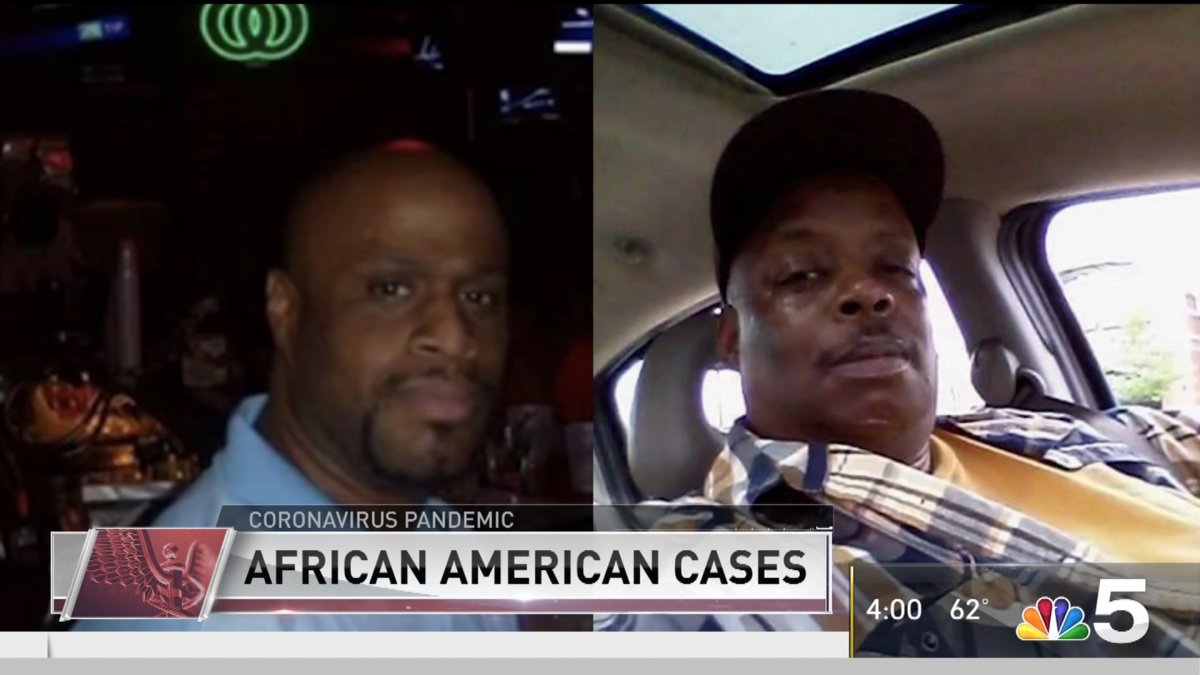
Data shows a higher number of African Americans are dying from coronavirus complications in Illinois, particularly in Chicago, officials said Monday. NBC 5’s Regina Waldroup has the story.
Data shows a higher number of African Americans are dying from coronavirus complications in Illinois, particularly in Chicago, officials said Monday.
According to statistics as of April 5, 1,824 of Chicago's 4,680 cases at the time were confirmed in black residents. That's compared to 847 white Chicagoans, 478 Hispanic or Latinx Chicagoans and 126 Asian Chicagoans. Another 25% of cases did not cite race or ethnicity and officials estimate Hispanic cases "are likely undercounted."
The more striking disparity, however, comes in the number of Chicago's fatalities, which sat at a total of 98 on Sunday.
Data showed that among the deaths where race or ethnicity were known, 72% were among black city residents, despite black Chicagoans being only 30% of the city's overall population.
“This new data offers a deeply concerning glimpse into the spread of COVID-19 and is a stark reminder of the deep-seated issues which have long created disparate health impacts in communities across Chicago,” Chicago Mayor Lori Lightfoot said in a statement. “While this data is extremely troubling, we are determined to lessen the impact of COVID-19 by engaging communities that have traditionally been overlooked and that have suffered disinvestment and neglect for generations."
Similarly, Illinois health officials revealed Monday that African Americans account for 41 percent of COVID-19 deaths in the state and 29 percent of overall cases, despite being only 14 percent of the state's population.
Local
Officials have cautioned that while the data is not comprehensive, it indicates the pandemic may have a stronger impact on African-American communities.
"There was a rumor that African Americans were immune, and I hope people didn’t read that," Gov. J.B. Pritzker said during his Monday briefing. "That was obviously false. It’s also false that this adversely affects African Americans because COVID-19, by its very nature, has a disproportionate affect on African Americans. It’s realistically the things Dr. Ezike said - The poor healthcare that’s been provided because of years of disinvestment in their communities and pre-existing conditions. We are countering it by re-opening hospitals in those communities, and by making sure we’re messaging properly using social media and our 'All In Illinois' campaign to message directly into the African-American community."
Dr. Zaher Sahloul, a critical care specialist at both St. Anthony and Advocate Christ Medical Center, echoed that there are likely multiple reasons coronavirus could be adversely affecting African American populations.
"They have more non-communicable diseases - hypertension, diabetes, obesity - major factors," Sahloul said. "Also they tend to live in larger families, with smaller apartments. Difficult to enforce social distancing."
Lightfoot announced plans Monday to implement a "robust, multi-faceted community engagements strategy" aimed at educating impacted communities on health guidance that correlates with their "everyday realities."
“Even before our COVID-19 response, CDPH was committed to closing the racial life-expectancy gap," Allison Arwady, commissioner of CDPH, said in a statement. "White Chicagoans live, on average, almost nine years longer than black Chicagoans, and half of that gap is due to higher rates of underlying chronic diseases, like heart and lung disease, diabetes, and smoking-related illness in black communities. These rates in turn are driven by community conditions, the holes in our social safety net, and decades of policy that segregated people by race, drove different levels of community investment, and led to an unfair distribution of resources that persists to this day. As a city, under the mayor’s leadership, we’ve been facing these huge, historic problems head-on. But our COVID-19 data is a clear reflection of these underlying inequities. This is true in Chicago, and true around the U.S.”
For most people, the coronavirus causes mild or moderate symptoms, such as fever and cough that clear up in two to three weeks. For some, especially older adults and people with existing health problems, it can cause more severe illness, including pneumonia, and death.
Chicago is among multiple cities with large black populations considered hot spots for the coronavirus, along with New York, Detroit, Milwaukee and New Orleans. Figures released Monday by Michigan's Department of Health and Human Services showed African Americans, who make up 14% of the state population, make up about 33% of cases statewide and 41% of deaths.
Detroit, which is about 80% black, has recorded 5,032 confirmed cases with 196 people dead from complications due to the COVID-19 virus.
Coronavirus data specific to black residents was not available from the city, but Detroit and its surrounding suburbs account for about 80% of the state's confirmed cases.
“Part of what we’re seeing in Detroit is that there’s such a high number of individuals who have those underlying conditions, who have the diabetes and the heart disease, who may have obesity,” Dr. Joneigh Khaldun, Michigan’s chief medical executive who previously led Detroit’s health department, said earlier this month.